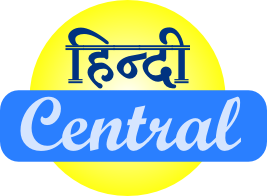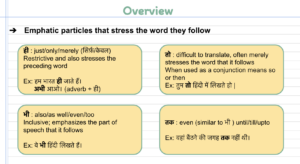Review: Elementary Hindi 102
Textbook lesson 9-15
Everything from the textbook.
Lesson 9
The imperfect present tense (Habitual tense)
खाना – to eat
I eat samosa. ( मैं समोसा खाता हूँ। )
I eat samosa. ( मैं समोसा खाती हूँ। )
She eats samosa. (वह समोसा खाती है। )
He eats samosa. (वह समोसा खाता है।)
We eat samosa. ( हम समोसा खाते हैं।)
We (f.) eat samosa. (हम समोसा खाती हैं।)
They eat samosa. (वे समोसा खाते हैं।)
They (f.) eat samosa. (वे समोसा खाती हैं।)
You eat samosa. ( तू समोसा खाती है।)
You eat samosa. (तू समोसा खाता है।)
You eat samosa. (तुम समोसा खाती हो।)
You eat samosa. (तुम समोसे खाते हो।)
You eat samosa. (आप समोसा खाते हैं।)
You eat samosa. ( आप समोसा खाती हैं।
ko construction
X ko janna मैं दीपक को जानती हूँ।
To give देना vt. मैं दीपक को किताब देती हूँ।
To sell बेचना vt. मैं दीपक को किताब बेचती हूँ।
To tell बताना vt. मैं आपको बताती हूँ।
To explain समझाना vt. मैं आपको समझाती हूँ।
To teach पढ़ाना vt. मैं बच्चों को पढ़ाती हूँ।
To show दिखाना vt. मैं दीपक को तस्वीर दिखाती हूँ।
को never comes with
जाना – मैं भारत जाती हूँ।
आना- मैं घर आता हूँ।
X के पास जाना go to X
मैं डॉक्टर के पास अक्सर जाता हूँ. I go to see the doctor.
वह धोबी के पास जाता है. I go to the washerman.
मैं प्रोफेसर के पास जाती हूँ. I go to the professor.
Ko with dates
एक तारीख़ को मेरा जन्मदिन है.
दो तारीख़ को मेरी शादी है.
तीन तारीख़ को मेरी क्लास है.
चार तारीख़ को मेरी छुट्टी है.
पाँच तारीख़ को मेरा प्रेजेंटेशन है.
Ko with week
-
-
सोमवार को on Monday ( we read a book on Monday)
-
मंगलवार को on Tuesday (She eats guava on Tuesday.)
-
बुधवार को on Wednesday(He takes pictures on Wed
-
वीरवार/गुरुवार को on Thursday They drink tea on Thu
-
शुक्रवार को on Friday No one comes here on Friday
-
शनिवार को on Saturday Nobody has an exam on Sat
-
इतवार को on Sunday We party on Sunday.
-
Lesson 10
Vocabulary
https://docs.google.com/document/d/1ELMcG3sXa0qSqpMDBjXAxqCENWjI08Rh/edit
होना
गुलाब लाल होता है।
सिगरेट पीने से मेरे सिर में दर्द होता है।
The habitual past tense
मैं दिल्ली में रहती थी। I used to live in Delhi.
The use of अपना “one’s own” (page 82) वह अपना खाना खाती है। She eats her food.
Lesson 11
Vocabulary
https://docs.google.com/document/d/1T1XtZMdCJm4x7fw8XQERCSw_-LE9pWFtwaClvw4vFUo/edit
Our focus is on three similar reflexive words meaning “by oneself”
-
अपने-आप
-
आप ही
-
खुद
The Narrative past tense
जब मैं छोटा था तो अपने नानी के घर जाता। वहाँ मैं सेब खाता।
CONTRARY TO FACT STATEMENTS
“If I had gone to class, I would have known the answer”
“अगर में कक्षा में जाता, तो जवाब जानता”
“If he went to the store, he would have bought bread”
“अगर वह दुकान जाता, तो वह ब्रेड खरीदता”
“If they made the right turn, they would not have been late”
“”अगर वे सही टर्न लेते, तो उन्हें देर नहीं होती”
Lesson 12
Vocabulary
https://docs.google.com/document/d/1jPGfvuvS0LLIebf6exTNLRDi0yecSHQQfUeSIDZe1J8/edit
Indicative Past Tense
Transitive or Intransitive
Ask a question with What did you___?
If you find a possible answer then it is transitive.
Meaning it will take ne
Example:
What did you read?
A book
It is transitive.
What did you sleep?
No answer
It is intransitive.
-
I made food. मैंने खाना बनाया
-
I read books. मैंने किताबें पढ़ीं।
-
I watched a movie. मैंने फ़िल्म देखी
-
I laughed. मैं हँसी
-
I woke up. मैं उठी
-
I bath मैं नहाई
-
I ate. मैंने खाना खाया।
Verbs that are considered intransitive in the past:
· लाना to bring
· डरना to fear
· मिलना to meet
· भूलना to forget
Verbs that may function as either transitive or intransitive:
· समझना to understand
· बोलना to speak
· लड़ना to fight
· बदलना to change
Remember the postposition with these verbs.
से बोलना to speak
से पूछना to ask
को बताना to tell
को/ से कहना to say
Adverb of time
Last year I was in Delhi. पिछले साल
Next week अगले हफ़्ते
Tomorrow कल
Yesterday I read a book. कल
I always like Shahrukh Khan. हमेशा
Sometimes I eat pizza. कभी कभी
Often I don’t like to run. अक्सर
Verbs to know
Lesson 13
Vocabulary
https://docs.google.com/document/d/1q14FA2rV-xCalBlYofY1E61MqAMF_SXu-jYpZEzFCUM/edit
बच्चे पैदल जाते हैं।
लड़की साइकल से स्कूल जाती है।
Post position
में in
पर at/on
तक upto/until
से from/since
को to
Compound postposition
के लिए for
के साथ with X
के पास near/ have
के सामने across/ in front of
के पीछे behind X
के नीचे beneath X
के अंदर inside X
के बाहर outside X
Possession in Hindi
का/के/की क्या यह आपका घर है? Is this your home?
For family members, friends, body parts, legal ownership
के पास- things that you can sell or buy/people you can hire or fire. With time ————-also proximity
The present perfect tense.
I have eaten. मैंने खाया है.
The past perfect tense
I had played soccer. मैंने सॉकर खेला था.
The oblique infinitive +लायक़
दिल्ली में क्या क्या देखने लायक़ है।
Word order
Day मंगलवार को
Time बारह बजे
Who did उसने
Location बिस्तर पर
Negative particle
Verb (Action done) खाना खाया।
मंगलवार को बारह बजे उसने बिस्तर पर खाना खाया।
Lesson 14
Vocabulary
https://docs.google.com/document/d/1u6KLv9yIPdQoyY3fGPahnq3EwORsr92LWfYV5QN4kqU/edit
The progressive aspect
-
Take the stem of the main verb
-
करना → कर
-
-
Add the perfect participle of रहना
-
रहा (M.S.) / रहे (M.P or respectful) / रही (F. S. and F. P.)
-
Must agree in number and gender with the subject
-
-
Add the correct form of होना (simple present tense)
-
हूँ (1st person singular) / है (3rd person singular) / हो (2nd person singular)/ हैं (plural)
-
Must agree in number and person with the subject वह विश्वविद्यालय में नहीं जा रहा है He is not going into the university.
-
Note: Present progressive is not used to express statements such as “I am sitting down” or “I am standing” unless the act of sitting is actually taking place
The past progressive
क्या तुम्हारे भाई भी हिंदी पढ़ रहे थे? Were your brothers also studying Hindi?
Lesson 15
Vocabulary
https://docs.google.com/document/d/1YXcHDZRHAoAH12IJ0N5hbdXLdHC4asTSSUHa_x8MMFM/edit





